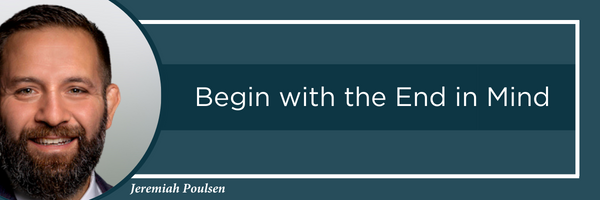“Begin with the end in mind.” It’s a phrase that has been stated and restated for decades. I first came across this concept while reading The 7 Habits of Highly Effective People by Stephen Covey. I was highly intrigued by the way the author framed this particular practice. The best way to describe his approach is a bit jarring at first: he prescribes an autobiographical eulogy.
Covey encourages his readers to imagine going to a funeral. Shortly after arriving, you recognize yourself in the coffin. Then you sit in on the ceremony, imagining who might speak on your behalf and what they might say. Covey asks us to choose four people specifically–a family member, a friend, a work colleague, and a community member, such as from a church or volunteer group–and think about what they’d say in their eulogy. Naturally, while you picture your friends, family, and colleagues taking turns at the podium, you start to think about how you’d like to be remembered. When you can no longer speak on your own behalf, when you are past the point of explanation or justification, what legacy will you leave to inspire the eulogies and fill the obituary column?
For some, this practice might seem morbid or depressing. But it’s nothing more than an opportunity to exercise the mind and focus on the things that matter most. Take five minutes to think about who those four people would be. Start with the family member. Is it your mother? Your father? Your brother, sister, or child? Once you have chosen someone, write their name down, and imagine them walking up to the podium. As they “speak” in your imagination, ask yourself: what do I hope they’ll say? Then do the same for the friend, the colleague, and the member of your community. Write their names down, too, and think about what you’d like them to say.
Finally, ask yourself: am I living in a way that helps them say these things? Am I doing the things I want to be remembered for? Am I walking the walk? Each of us hopes to leave a positive legacy, which requires us to live our lives well. But we know that time will run out at some point. The book of our life will be completed, and there will be nothing more we can do or say to change how it reads.
This leads us to our call to action. What’s one thing you could do to shift, to move, to talk, to act in a way that would honor your autobiographical eulogy? That is beginning with the end in mind: picturing an ideal future, and working in the present to make that ideal a reality. I’ll close with a quote from Covey:
“How different our lives are when we really know what is deeply important to us, and, keeping that picture in mind, we manage ourselves each day to be and to do what really matters most. If the ladder is not leaning against the right wall, every step we take just gets us to the wrong place faster. We may be very busy, we may be very efficient, but we will also be truly effective only when we begin with the end in mind.” Stephen Covey, The 7 Habits of Highly Effective People
If you’re interested in this practice and in how it can help you become a stronger leader, send me an email at [email protected]. I’d love to help you.

Comments (0)